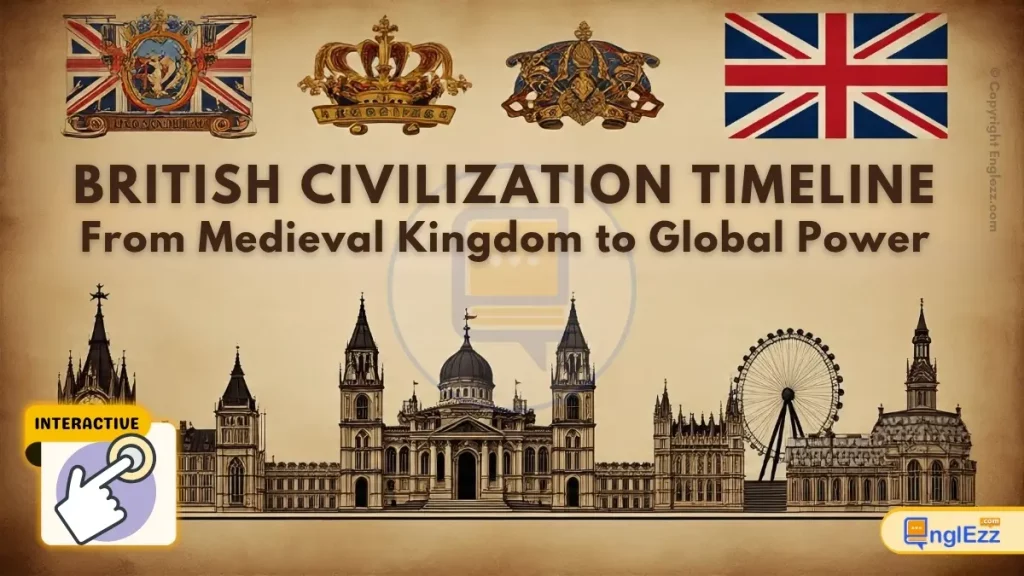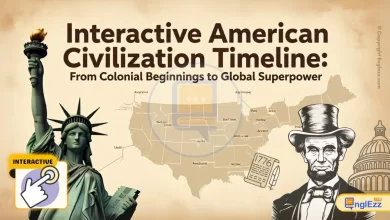The British Civilization Timeline
How Did Britain Emerge As A Global Power Since 1066?
Introduction
The Evolution of British Civilization
The story of British civilization is one of remarkable transformation—from a medieval kingdom on the edge of Europe to a global power that shaped the modern world. For nearly a millennium, Britain has experienced profound political, social, and cultural changes that have influenced nations across the globe.
This timeline traces Britain’s journey from the Norman Conquest in 1066 through the development of parliamentary democracy, the Industrial Revolution, the rise and fall of the British Empire, to its current position as a major cultural and economic force in the 21st century.
Throughout this evolution, Britain has produced groundbreaking innovations in governance, science, literature, and industry while developing distinctive cultural traditions that blend continuity with adaptation. The British story is one of both tradition and revolution—a society that values its ancient institutions while repeatedly reinventing itself to meet new challenges.
Medieval & Tudor Britain
The foundations of British civilization were laid during the medieval period, beginning with the Norman Conquest in 1066. This era saw the development of common law, Parliament, and the English language as we know it today. The Tudor dynasty (1485-1603) brought religious reformation, the beginnings of English naval power, and a cultural flowering exemplified by Shakespeare.
Stuart & Georgian Britain
The Stuart period (1603-1714) witnessed civil war, revolution, and the establishment of constitutional monarchy. The Georgian era (1714-1837) brought stability, the beginnings of industrialization, and imperial expansion. During these centuries, Britain developed its distinctive political system, with Parliament gradually gaining supremacy over the Crown.
Victorian & Modern Britain
Victorian Britain (1837-1901) was transformed by industrialization, urbanization, and imperial expansion. As the first industrial nation, Britain led technological innovation while grappling with profound social changes. The 20th and 21st centuries brought further transformation through two world wars, decolonization, the development of the welfare state, and adaptation to a post-imperial role.
Explore the interactive timeline below to discover key events that shaped British civilization. Click on any event to learn more, and test your knowledge with our quiz when you’re ready!
Timeline
Norman Conquest
William, Duke of Normandy, defeats King Harold at the Battle of Hastings and becomes King of England.
Read moreThe Norman Conquest represents one of the most significant turning points in British history. Following the death of the childless Edward the Confessor in January 1066, three contenders claimed the English throne: Harold Godwinson (who was crowned King Harold II), Harald Hardrada of Norway, and William, Duke of Normandy.
William’s victory and subsequent coronation on Christmas Day 1066 transformed England’s political, social, and cultural landscape. The Norman rulers replaced the Anglo-Saxon aristocracy with Norman nobles, introduced feudalism, built castles across the landscape, and made French the language of the elite.
The most comprehensive record of post-conquest England is found in the Domesday Book, commissioned by William in 1086—a remarkable survey of land ownership and resources that demonstrated the new king’s determination to understand and control his realm.
Magna Carta
King John is forced by barons to sign the Magna Carta, limiting royal power and establishing key legal principles.
Read moreThe Magna Carta (Great Charter) was sealed by King John at Runnymede in June 1215 after a rebellion by his barons, who were frustrated by heavy taxation, failed military campaigns, and the king’s arbitrary rule.
While many of its 63 clauses dealt with specific medieval grievances, several established enduring principles: that the king was subject to the law, not above it; that free men had the right to justice and a fair trial; and that taxation required consent.
Though King John repudiated the charter almost immediately, leading to civil war, subsequent monarchs reissued revised versions. The Magna Carta’s significance grew over time as later generations interpreted it as a defense of liberty against tyranny.
Black Death
The bubonic plague kills approximately one-third of England’s population, transforming society and the economy.
Read moreThe Black Death, a devastating outbreak of bubonic plague, reached England in June 1348 and spread rapidly throughout the country. By the time the initial epidemic subsided in 1350, approximately one-third of England’s population had perished.
The immediate aftermath saw acute labor shortages that strengthened the bargaining power of surviving peasants and workers. Wages rose dramatically, while land values and food prices fell. The government’s attempt to control wages through the Statute of Laborers (1351) proved largely ineffective.
The plague accelerated social mobility and the decline of the feudal system. Many peasants were able to acquire land or negotiate better terms with landlords. The psychological impact of such massive mortality also influenced art, literature, and religious expression.
English Reformation
Henry VIII breaks with Rome and establishes the Church of England with himself as Supreme Head.
Read moreThe English Reformation began as a political dispute rather than a theological movement. When Pope Clement VII refused to annul Henry VIII’s marriage to Catherine of Aragon, Henry took matters into his own hands through a series of parliamentary acts between 1532 and 1536.
This religious revolution was consolidated through the dissolution of the monasteries (1536-1541), which eliminated Catholic institutional power in England and transferred vast monastic wealth and lands to the Crown.
Though Henry himself remained largely traditional in his religious beliefs, the break with Rome opened the door for Protestant ideas to gain influence in England. Elizabeth I (1558-1603) eventually established a moderate Protestant settlement that became a defining feature of English national identity.
Defeat of the Spanish Armada
England defeats the Spanish Armada, securing its independence and establishing naval supremacy.
Read moreIn 1588, King Philip II of Spain launched the “Enterprise of England”—a massive naval invasion force intended to depose the Protestant Queen Elizabeth I and restore Catholicism to England. The Spanish Armada consisted of 130 ships carrying over 30,000 men.
The English fleet, commanded by Lord Howard of Effingham with Sir Francis Drake as his second-in-command, was smaller but more maneuverable. Using innovative tactics, including fire ships sent into the Spanish fleet while anchored at Calais, the English prevented the Armada from linking up with Spanish forces in the Netherlands.
The defeat of the Armada had profound consequences. It prevented Spanish dominance of northwestern Europe and secured England’s independence. The victory was portrayed as a divine vindication of English Protestantism and greatly enhanced Elizabeth’s prestige. It marked the beginning of the decline of Spanish naval power and the rise of England as a major maritime force.
English Civil War
Conflict between Crown and Parliament leads to civil war, the execution of Charles I, and a brief republican experiment.
Read moreThe English Civil War represented the culmination of growing tensions between King Charles I and Parliament over issues of religion, taxation, and the extent of royal authority. The conflict began in 1642 when Charles raised his standard at Nottingham.
The war was fought between “Royalists” (Cavaliers) who supported the king and “Parliamentarians” (Roundheads) who challenged his authority. After initial Royalist successes, the tide turned with the formation of Parliament’s New Model Army under the leadership of Sir Thomas Fairfax and Oliver Cromwell.
In an unprecedented action, Charles I was put on trial for treason against his people and executed on January 30, 1649. The monarchy and House of Lords were abolished, and England became a republic known as the Commonwealth, later evolving into the Protectorate under Oliver Cromwell. This radical experiment ended with the Restoration of the monarchy under Charles II in 1660, but the principle that the monarch ruled with the consent of Parliament had been firmly established.
Glorious Revolution
James II is overthrown and replaced by William and Mary, establishing constitutional monarchy and parliamentary supremacy.
Read moreThe Glorious Revolution, also called the “Bloodless Revolution,” marked a decisive shift in the balance of power between Crown and Parliament. When the Catholic King James II produced a male heir in June 1688, threatening a Catholic dynasty, a group of Protestant nobles invited William of Orange (husband of James’s Protestant daughter Mary) to invade England.
Parliament declared that James had abdicated and offered the crown jointly to William and Mary, who accepted along with the Declaration of Rights (later enacted as the Bill of Rights 1689). This landmark document established key constitutional principles: the monarch could not suspend laws, levy taxes, or maintain a standing army without Parliament’s consent.
The Glorious Revolution established the principle that sovereignty resided in Parliament rather than the Crown, creating a constitutional monarchy that continues to this day. It prevented the development of absolute monarchy in Britain and set the stage for the political stability that would facilitate Britain’s commercial and imperial expansion in the 18th century.
Act of Union with Scotland
England and Scotland unite to form Great Britain, creating a single market and parliament.
Read moreThe Acts of Union, passed by the English and Scottish Parliaments in 1707, united the two kingdoms into a single sovereign state called Great Britain. This political union followed the earlier personal union of the crowns in 1603, when James VI of Scotland also became James I of England.
Several factors drove the union: England wanted to secure the Protestant succession and prevent Scotland from potentially allying with France; Scotland had suffered economic hardship following the failed Darien scheme and sought access to England’s growing empire and markets.
The union preserved certain Scottish institutions, including its legal and educational systems and the Presbyterian Church. While initially unpopular in Scotland, the union eventually proved economically beneficial for both nations. It created the largest free trade area in Europe and allowed Scots to participate fully in Britain’s expanding commercial and imperial ventures.
Industrial Revolution
Britain becomes the world’s first industrial nation, transforming its economy, society, and global position.
Read moreThe Industrial Revolution began in Britain around 1760 and represented the most fundamental transformation of human society since the development of agriculture. It marked the transition from an economy based on manual labor to one dominated by machine manufacturing, chemical manufacturing, and new iron production processes.
Several factors made Britain the birthplace of industrialization: it had abundant coal and iron resources; a stable political system; growing capital from trade and empire; a unified market without internal tariffs; strong property rights and patent laws; and a culture that valued practical innovation.
The social consequences were profound. Britain transformed from a predominantly rural society to an urban one, with cities growing at unprecedented rates. New social classes emerged: industrial capitalists and a factory working class. The revolution dramatically increased productivity and living standards over the long term, though its immediate benefits were unevenly distributed.
Victorian Era
Queen Victoria’s long reign sees Britain at the height of its imperial power and industrial might.
Read moreThe Victorian era, spanning Queen Victoria’s 63-year reign, represented the apex of British power and influence globally. During this period, Britain became the world’s leading industrial, financial, and naval power, with an empire that eventually covered approximately one-quarter of the Earth’s land surface.
This was an age of remarkable contrasts. Unprecedented wealth creation coexisted with extreme poverty; scientific and technological progress accelerated while traditional religious beliefs remained strong. The era saw significant political reforms, including the expansion of voting rights through the Reform Acts of 1832, 1867, and 1884.
Victorian Britain produced extraordinary cultural and intellectual achievements. Literature flourished with writers like Charles Dickens, the Brontë sisters, and Thomas Hardy. Scientific advances included Charles Darwin’s theory of evolution and Michael Faraday’s work on electricity. The Great Exhibition of 1851 celebrated Britain’s industrial supremacy and imperial reach.
Abolition of Slavery
Britain abolishes slavery throughout its empire and leads international efforts against the slave trade.
Read moreThe abolition of slavery in the British Empire was achieved through a long campaign that began in the late 18th century. Led by figures such as William Wilberforce, Thomas Clarkson, and Olaudah Equiano, the abolitionist movement combined religious conviction, humanitarian concern, and economic arguments.
The first major victory came with the Slave Trade Act of 1807, which outlawed the slave trade throughout the British Empire. This was followed by the Slavery Abolition Act of 1833, which provided for the gradual emancipation of all slaves in the British colonies. Full emancipation was finally achieved in 1838.
After abolishing slavery in its own territories, Britain used its naval power and diplomatic influence to pressure other nations to end the slave trade and slavery. The Royal Navy’s West Africa Squadron patrolled the Atlantic, intercepting slave ships and liberating their human cargo.
First World War
Britain emerges victorious but at enormous human and economic cost, marking the beginning of imperial decline.
Read moreThe First World War (1914-1918) represented a watershed in British history. When Britain declared war on Germany on August 4, 1914, following the German invasion of Belgium, few anticipated the scale and duration of the conflict that would follow.
The war became a total conflict, mobilizing the entire society and economy. Women entered the workforce in unprecedented numbers, taking on roles previously reserved for men. On the battlefield, new technologies like machine guns, tanks, aircraft, and poison gas transformed warfare. Britain lost nearly 750,000 military personnel, with another 1.7 million wounded.
Though Britain and its allies ultimately prevailed, the victory came at an enormous cost. The war accelerated social change, contributing to women gaining partial suffrage in 1918 and full voting equality in 1928. It weakened Britain financially, transforming the nation from a global creditor to a debtor and beginning the shift of financial power to the United States.
Creation of the Welfare State
The post-war Labour government establishes the National Health Service and comprehensive social security.
Read moreThe creation of Britain’s welfare state represented one of the most significant social policy developments of the 20th century. Following the Labour Party’s landslide victory in the 1945 general election, Clement Attlee’s government implemented sweeping reforms based largely on the 1942 Beveridge Report.
The cornerstone of the new welfare state was the National Health Service (NHS), established on July 5, 1948. The NHS provided comprehensive healthcare free at the point of use for all citizens, regardless of wealth or status—a revolutionary concept at the time.
Other key reforms included the National Insurance Act (1946), which extended social security coverage; the Children Act (1948), which improved child welfare services; and the Housing Act (1949), which expanded public housing. These reforms were implemented despite severe economic constraints in the aftermath of World War II.
Decolonization
The British Empire transforms into the Commonwealth as former colonies gain independence.
Read moreThe process of decolonization transformed Britain’s relationship with the world and its own identity. Beginning with the independence of India and Pakistan in 1947, Britain gradually relinquished direct control over its colonial possessions. By the time Hong Kong was returned to China in 1997, the vast British Empire had been almost entirely dismantled.
Several factors drove decolonization: growing nationalist movements in the colonies; Britain’s diminished economic and military capacity after World War II; changing international opinion against colonialism; and the emergence of the Cold War, which put pressure on Western powers to grant independence.
The Commonwealth of Nations evolved as a voluntary association of former British colonies and dominions, maintaining links with Britain while asserting their independence. Immigration from former colonies, particularly the Caribbean and South Asia, transformed Britain into a more multicultural society.
European Integration and Brexit
Britain joins the European Economic Community in 1973 but votes to leave the European Union in 2016.
Read moreBritain’s relationship with European integration has been complex and often ambivalent. After initially standing apart from the European Coal and Steel Community (1951) and the European Economic Community (1957), Britain successfully joined the EEC in 1973 under Edward Heath’s Conservative government.
Throughout the following decades, Britain maintained a distinctive position within European integration—joining the Single Market but opting out of the Schengen Agreement on open borders and the Euro currency. Tensions over sovereignty, regulation, budget contributions, and immigration persisted.
These tensions culminated in the 2016 Brexit referendum, in which 52% voted to leave the European Union. After complex negotiations and political turmoil, Britain formally left the EU on January 31, 2020, with a transition period until December 31, 2020. The Brexit decision reflected deep divisions in British society and raised fundamental questions about British identity and place in the world.
Quiz Time
Test Your Knowledge: British Civilization Quiz
1. Who led the Norman Conquest of England in 1066?
2. What document, signed in 1215, limited the power of the English monarch?
3. Which Tudor monarch established the Church of England?
4. What was the name of the Spanish naval force defeated by England in 1588?
5. Which Stuart king was executed in 1649 following the English Civil War?
6. In what year did the Acts of Union unite England and Scotland to form Great Britain?
7. When was slavery abolished throughout the British Empire?
8. Queen Victoria’s reign lasted from 1837 until what year?
9. Which post-war British government established the National Health Service?
10. When did Britain formally leave the European Union?
FAQs
Frequently Asked Questions
These terms are often confused but refer to different geographical and political entities:
- England: The largest country within the United Kingdom, occupying the southern part of the island of Great Britain.
- Great Britain: The largest island in the British Isles, comprising England, Scotland, and Wales.
- United Kingdom: The full name is “The United Kingdom of Great Britain and Northern Ireland.” It is a sovereign state consisting of four countries: England, Scotland, Wales, and Northern Ireland.
Scotland, Wales, and Northern Ireland have their own devolved governments with varying powers, while the UK Parliament at Westminster retains authority over matters like defense, foreign policy, and macroeconomic policy.
The British Empire grew to become the largest in history through several interconnected factors:
- Naval supremacy: Britain’s powerful Royal Navy controlled key shipping routes and could project power globally.
- Commercial expansion: Trading companies like the East India Company initially established footholds that later became formal colonies.
- Industrial advantage: Britain’s early industrialization provided economic and military advantages over potential rivals and indigenous populations.
- Strategic competition: Rivalry with other European powers drove acquisition of territories.
- Settlement colonies: In regions like North America, Australia, and New Zealand, British settlers established new societies.
At its height in the early 20th century, the British Empire covered approximately 24% of the Earth’s total land area and governed about 23% of the world’s population.
Britain is often described as having an “unwritten” or “uncodified” constitution, which means its constitutional rules are not contained in a single document but are found in various sources:
- Statute law: Acts of Parliament with constitutional significance, such as the Bill of Rights (1689), Act of Settlement (1701), and Human Rights Act (1998).
- Common law: Legal principles established through judicial decisions.
- Constitutional conventions: Non-legal but binding customs that regulate the behavior of constitutional actors.
- Works of authority: Scholarly texts that are considered authoritative on constitutional matters.
- Treaties: International agreements that affect constitutional arrangements.
This arrangement evolved gradually rather than through revolution or a single founding moment. The flexibility of this system has allowed the British constitution to adapt over time without formal amendment procedures.
Immigration has profoundly transformed British society, particularly since World War II:
- Post-war migration: Labor shortages after 1945 led to recruitment from former colonies, particularly the Caribbean (the “Windrush generation”), India, Pakistan, and Bangladesh.
- European migration: EU freedom of movement brought significant migration from Europe, especially after the 2004 enlargement that included Eastern European countries.
- Refugee movements: Various conflicts have brought refugee communities to Britain, including Ugandan Asians in the 1970s and more recently, people from Syria and Afghanistan.
- Cultural impact: Immigration has transformed British cuisine, music, literature, and other cultural forms. Cities like London, Birmingham, and Manchester have become highly diverse, multicultural centers.
The 2011 census showed that 13% of UK residents were born abroad, a figure that has likely increased since then. Immigration has become a fundamental part of modern British identity.
Conclusion
The Evolution of British Civilization
The journey of British civilization from 1066 to the present day represents one of history’s most remarkable national transformations. From a medieval kingdom on the periphery of Europe to a global power that shaped the modern world, Britain’s evolution has been characterized by both continuity and change, tradition and innovation.
Several themes emerge from this historical narrative. First, the gradual development of constitutional governance, from the Magna Carta through the English Civil War and Glorious Revolution to modern parliamentary democracy, established principles that would influence political systems worldwide. Second, Britain’s pioneering role in the Industrial Revolution fundamentally altered not only its own society but the global economy. Third, the rise and fall of the British Empire connected diverse peoples and cultures across the globe, with complex legacies that continue to shape international relations today.
Throughout its history, Britain has demonstrated a remarkable capacity for adaptation and reinvention while maintaining connections to its past. Its political institutions, though ancient in origin, have evolved to meet new challenges. Its society has been transformed by industrialization, urbanization, immigration, and technological change, yet retains distinctive cultural traditions.
Key Takeaways
Medieval Foundations
The Norman Conquest and subsequent medieval developments established enduring patterns in British governance, including common law, parliamentary representation, and the tension between monarchical authority and aristocratic privilege.
Tudor Transformations
The Tudor period saw England emerge as a distinct Protestant nation with growing naval power. The break with Rome under Henry VIII and the defeat of the Spanish Armada under Elizabeth I established England’s independence from continental powers.
Constitutional Revolution
The Stuart era’s conflicts between Crown and Parliament culminated in the establishment of constitutional monarchy and parliamentary supremacy. The principle that rulers govern with the consent of the governed became central to British political identity.
Industrial Pioneer
Britain’s role as the world’s first industrial nation transformed not only its own society but established patterns of economic development that would spread globally. The combination of technological innovation, capital accumulation, and global trade networks created unprecedented wealth.
Imperial Zenith
Victorian Britain’s global dominance represented the height of its international influence. The empire facilitated the spread of British institutions, language, and culture worldwide while also creating complex legacies that continue to shape international relations.
Post-Imperial Adaptation
Modern Britain has demonstrated remarkable resilience in adapting to the loss of empire, developing the welfare state, and evolving into a multicultural society. Its continued global influence rests less on military or economic dominance than on soft power.
Bibliography
- Allen, R. C. (2009). The British Industrial Revolution in global perspective. Cambridge University Press.
- Cannadine, D. (2017). Victorious century: The United Kingdom, 1800-1906. Viking.
- Colley, L. (2009). Britons: Forging the nation 1707-1837. Yale University Press.
- Darwin, J. (2009). The empire project: The rise and fall of the British world-system, 1830-1970. Cambridge University Press.
- Hennessy, P. (2006). Never again: Britain 1945-1951. Penguin Books.
- Purkiss, D. (2007). The English Civil War: A people’s history. Harper Perennial.
- Wilson, A. N. (2003). The Victorians. W. W. Norton & Company.









